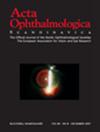Autoinflammatory syndromes: Recent data from the international aida network registries
Abstract
Correspondence to: Dr Claudia Fabiani, Ophthalmology Unit, Department of Medicine, Surgery and Neurosciences, University of Siena and Azienda Ospedaliero-Universitaria Senese [European Reference Network (ERN) for Rare Immunodeficiency, Autoinflammatory, and Autoimmune Diseases (RITA) Center], Policlinico “Le Scotte”, viale Bracci 16, 53100 Siena, Italy; email: [email protected]
The AutoInflammatory Disease Alliance (AIDA) network represents a global collaboration among physicians and researchers aimed at fostering the exchange of knowledge and insights into autoinflammatory disorders and ocular inflammatory diseases. (1,2) At the core of this initiative are international registries, meticulously designed to serve as comprehensive repositories of data for better understanding these complex conditions. Presently, the AIDA team has established ten physician-driven registries targeting specific inflammatory diseases, encompassing a wide spectrum such as non-infectious uveitis, non-infectious scleritis, Behcet's disease, Still's disease, spondyloarthritis, monogenic autoinflammatory diseases, and Vexas syndrome. These registries are pivotal in accumulating detailed clinical data related to diseases affecting ocular structures, thus facilitating extensive research endeavors.
The primary objective of these registries is to mitigate the fragmentation of clinical and research experiences inherent in inflammatory ocular diseases, thereby enabling robust research based on large patient cohorts. The aims and methodologies of the AIDA registries have been meticulously outlined in published papers. (3-7) Employing a physician-driven, population- and electronic-based approach, these registries utilize the REDCap platform for comprehensive data collection. Data are meticulously gathered both retrospectively and prospectively, covering various aspects including demographic, genetic, clinical, laboratory, instrumental, and treatment details. Crucially, the employment of standardized common data elements ensures efficient data entry and consistency across diverse sites.
Maintaining utmost respect for patient privacy and data security, the AIDA registries strictly adhere to EU General Data Protection Regulations and international standards. Advanced pseudonymization tools like SPIDER safeguard patient identities, facilitating secure data exchange between registries without compromising confidentiality. The AIDA network boasts a vast membership, spanning 235 clinical sites across 46 countries and five continents, with 683 investigators actively contributing to ongoing research efforts. Since the launch of the Registries on ocular inflammatory diseases, enrollment has exceeded 4,020 patients, underscoring the pivotal role of recruitment activities in routine clinical practice.
In summary, the AIDA network and its registries epitomize a collaborative endeavor aimed at advancing the understanding and treatment of autoinflammatory and ocular inflammatory diseases on a global scale. Emphasizing the significance of data sharing and collaboration in scientific research, the network endeavors to push the boundaries of knowledge and improve patient outcomes worldwide.
Turning the focus to the AIDA Network International Registry on Vexas Syndrome (7), this study delves into the ocular manifestations of this recently recognized monogenic autoinflammatory syndrome in adults. Vexas syndrome, characterized by its diverse organ and tissue involvement, often presents with ocular inflammatory manifestations. This study seeks to elucidate these ocular conditions and explore potential associations with other disease manifestations. Among 59 Vexas patients, 27 (45.8%) exhibited inflammatory ocular involvement, with periorbital edema, episcleritis, and scleritis being most prevalent. A significant association was noted between ocular involvement and relapsing polychondritis (Relative Risk: 4.44, 95% C.I. 1.6-14.6, P = 0.01). Notably, patients with ocular inflammation displayed higher mortality rates, highlighting the need to investigate ocular inflammation as a potential prognostic indicator in Vexas syndrome. Ophthalmologists play a pivotal role in the diagnostic and management processes of Vexas syndrome, underscoring the interdisciplinary nature of addressing complex autoinflammatory disorders.
- Gaggiano C, Gupta V, Agrawal R, et al. Knowledge and Current Practices in Monogenic Uveitis: An International Survey by IUSG and AIDA Network. Ophthalmol Ther. 2024 Jan;13(1):127-147. doi: 10.1007/s40123-023-00839-1. Epub 2023 Nov 4. PMID: 37924480; PMCID: PMC10776548.
- Fonollosa A, Pelegrín L, García-Morillo S et al. Spanish Society of Ocular Inflammation (SEIOC) and the AutoInflammatory Diseases Alliance (AIDA) Network et al. Ocular involvement in adult and paediatric patients with monogenic autoinflammatory diseases: a Spanish multicentre retrospective study. Clin Exp Rheumatol. 2023 Oct;41(10):2105-2114. doi: 10.55563/clinexprheumatol/ukegcc. Epub 2023 Sep 28. PMID: 37812477.
- Vitale A, Della Casa F, Ragab G, et al. Autoinflammatory Diseases Alliance (AIDA) Network. Development and implementation of the AIDA International Registry for patients with Behçet's disease. Intern Emerg Med. 2022 Oct;17(7):1977-1986. doi: 10.1007/s11739-022-03038-1. Epub 2022 Jul 14. PMID: 35831701; PMCID: PMC9522756.
- Della Casa F, Vitale A, Pereira RM, et al. Autoinflammatory Diseases Alliance (AIDA) Network. Development and Implementation of the AIDA International Registry for Patients with Non-Infectious Scleritis. Ophthalmol Ther. 2022 Apr;11(2):887-897. doi: 10.1007/s40123-022-00466-2. Epub 2022 Jan 29. PMID: 35092604; PMCID: PMC8927486.
- Casa FD, Vitale A, Guerriero S,et al. Autoinflammatory Diseases Alliance (AIDA) Network. Development and Implementation of the AIDA International Registry for Patients with Non-Infectious Uveitis. Ophthalmol Ther. 2022 Apr;11(2):899-911. doi: 10.1007/s40123-022-00459-1. Epub 2022 Jan 31. PMID: 35099782; PMCID: PMC8927492.
- Gaggiano C, Vitale A, Tufan A,et al. Autoinflammatory Diseases Alliance (AIDA) Network. The Autoinflammatory Diseases Alliance Registry of monogenic autoinflammatory diseases. Front Med (Lausanne). 2022 Sep 9;9:980679. doi: 10.3389/fmed.2022.980679. PMID: 36160138; PMCID: PMC9500177.
- Vitale A, Caggiano V, Della Casa F, et al. Autoinflammatory Diseases Alliance (AIDA) Network. Development and Implementation of the AIDA International Registry for Patients With VEXAS Syndrome. Front Med (Lausanne). 2022 Jul 11;9:926500. doi: 10.3389/fmed.2022.926500. PMID: 35899212; PMCID: PMC9309690.

 求助内容:
求助内容: 应助结果提醒方式:
应助结果提醒方式:


